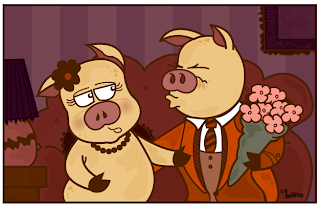By Anatoly Liberman
The spelling of those two words does not bother us only because both are so common and learned early in life. Yet why not shure and shugar? There is a parallel case, and it too leaves us indifferent, though for a different reason. Consider su in pressure, measure, pleasure, leisure, and the like. We do not question the occurrence of su in the middle of a Romance word, with its phonetic value of sh (as in cushion) or ge (as in genre and rouge) and pay no attention to azure, in which the same sound is designated by a more natural group zu. The French origin of pressure, azure, measure, and their ilk, let alone genre and rouge, is so obvious that perhaps even those who have never studied French are dimly aware of it. By contrast, sure and sugar are fully domesticated (only etymologists know all the details of their descent), and, even more important, su in them occurs word initially. It is their position at the beginning rather than in the middle of the word that causes surprise. However, both sure and sugar also came to English from French and in this respect have common cause with pressure and measure.
From a historical point of view, the story is simple. Consider the names of the letters U and Q, that is (in phonetic terms), yu and kyu. Before y, t becomes ch, s turns into sh, and z yields the voiced partner of sh. Listen to how you say what you…; it is probably indistinguishable from watch you. Many (most?) people pronounce unless you as unlesh you, and I have seldom heard anyone pronounce the title of Shakespeare’s play As You Like It with z before you: it is usually the same sound as in Measure for Measure. In the middle of the word, rather than at word boundaries, an analogous assimilation happened several centuries ago, and that is why nature and vision sound as though they were spelled nachure and vizion. This brings us to sugar and sure.
The vowel occurring in French sure was alien to most Middle English dialects, including the dialect of London, and, as the name of the modern English letter U shows, yu replaced French u in borrowed words. We can observe this substitution even in such a recent loanword as menu (and compare nubile and other nu- words). Once sure appeared in English, it turned into syure, and a similar change happened in sugar (syugar). Later, syu- developed into sh- (compare bless you, session, and Asia, regardless of whether you have a voiced or a voiceless middle in the last of them, for the voicing is secondary). As noted above, sure and sugar are such conspicuous monsters because word initially su- designates sh only in those two words. (Actually, the plant name sumach also has a variant with shu-, but it is known too little. Sumach makes a good riddle: “There are three English words in which initial su- has the value of shu-. The first t




[…] Jessamyn West tells us about Edubuntu, a version of Ubuntu designed for use in schools. You’ll want to read this, especially if your school has antiquated computers. […]